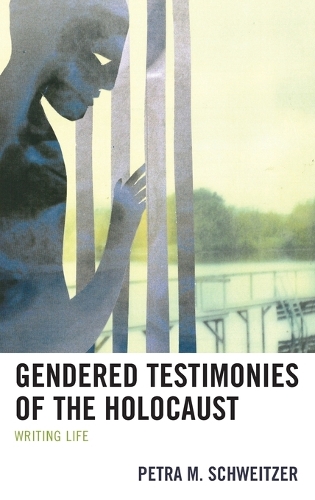
Gendered Testimonies of the Holocaust: Writing Life
(Hardback)
Available Formats
Publishing Details
Gendered Testimonies of the Holocaust: Writing Life
By (Author) Petra M. Schweitzer
Bloomsbury Publishing PLC
Lexington Books
8th April 2016
United States
Classifications
Tertiary Education
Non Fiction
The Holocaust
Second World War
809.93358405318
Physical Properties
Hardback
134
Width 161mm, Height 237mm, Spine 15mm
327g
Description
Gendered Testimonies of the Holocaust: Writing Life begins with the premise that writing proves virtually synonymous with survival, bearing the traces of life and of death carried within those who survived the atrocities of the Nazis. In reading specific testimonies by survivor-writers Paul Celan, Charlotte Delbo, Olga Lengyel, Gisella Perl, and Dan Pagis, this text seeks to answer the question: How was it possible for these survivors to write about human destruction, if death is such an intimate part of the survivors survival This book shows how the works of these survivors arise creatively from a vigorous spark, the desire to preserve memory. Testimony for each of these writers is a form of relation to oneself but also to others. It situates each survivors anguish in writing as a need to write so as to affirm life. Writing as such always bears witness to the life of the one who should be dead by now and thus to the miracle of having survived. This books claim is that the act of writing testimony manifests itself as the most intensive form of life possible. More specifically, its exploration of writings affirmation of life and assertion of identity focuses on the gendered dimension of expression and language. This book does not engage in the binary structure of gender and the hierarchically constructed roles in terms of privileging the male over the female. The criteria that guide its discussion on Gendered Testimonies emerge out of Levinass concept of maternity.
Reviews
Schweitzer (comparative literature, Shenandoah Univ.)reflects on the poetry and prose Paul Celan, Charlotte Delbo, Olga Lengyel, Gisella Perl, and Dan Pagis wrote as testimony to the suffering of women and children who died in German concentration camps in WW II. Drawing on writings of Derrida, Levinas, Lyotard, and Freud, Schweitzer examines, as she writes in the epilogue, the relations between the subject and other, and the text and its other." In the context of the Holocaust, she argues, "writing [is] survival ... an affirmation of life. In Celans poem Sprich auch Du, Schweitzer shows the pivotal role of language as a constructive agent, an advancer of Nazi Germanys anti-Semitic ideology. In looking at sadistic infanticide experiments, the author makes palpable the suffering inflicted on the minds and bodies of the mothers who were forced to abort their unborn without any palliative mediation. Though Schweitzer focuses in particular on the female, this volume illuminates the enormity of the atrocity Nazi's perpetrated on its victims, regardless of gender, sexual, artistic, ethnic, religious, or intellectual identity... Summing Up: Recommended. Upper-division undergraduates through faculty. * CHOICE *
This book provides a useful articulation of gendered analysis in life writing.... Schweitzer successfully brings together an analysis of the testimonial work of Holocaust survivors, both male and female; poets and prose writers. She rightly and persuasively concludes that each survivors testimony attests to an unconditional affirmation of life after survival undeniably linked to the act of writing. * European History Quarterly *
This sensitive and affirming work offers profound insights into the complexities and possibilities of survival. In exquisite readings of texts that emerge from the Holocaust, Petra Schweitzer shows us how writing and survival are inextricably linked, and how the specificity of one historical event can teach us about the struggles with survival that extend beyond it. At the heart of Schweitzers intense and compelling book is ultimately an affirmation of life from the very heart of death, an affirmation life, and of writing, in an era of catastrophic history. -- Cathy Caruth, Cornell University, author of Literature in the Ashes of History and Unclaimed Experience: Trauma, Narrative and History
Gendered Testimonies of the Holocaust: Writing Life is a deeply personal yet theoretically nuanced encounter with some of the most unforgettable texts of Holocaust literature. Pagis, Clan, Delbo, Lengyel, Perl. Schweitzers postmemorial witness conveys both the fragility and resilience of these testifying voices, in which trauma has been refracted through poetic imagination, lyric sensibility, and ethical commitment. The author reveals that the source of their enduring power is the trace of the maternal, the gentle breath of feminine presence in the texts penned by survivors, which envelops and cradles their broken bodies and wounded words, carrying the unbearable memories out of the darkest shadows and into the unconditional affirmation of life. -- Dorota Glowacka, University of King's College, Canada
Author Bio
Petra M. Schweitzer is associate professor of comparative literature at Shenandoah University.
